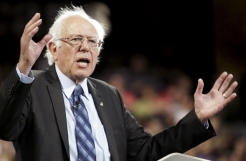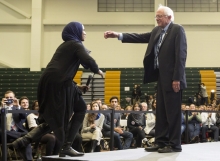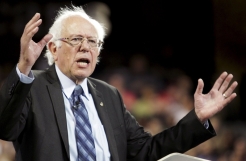Days before the Iowa caucus, Bernie Sanders has opened up about his faith, saying although he believes in God he was "not actively involved with organised religion".
In an interview with Washington Post, the candidate for the Democratic presidential nomination, who has often avoided or limited his conversation on his personal faith, said he believed in God: "I think everyone believes in God in their own ways. To me, it means that all of us are connected, all of life is connected, and that we are all tied together."
Sanders was brought up in the Jewish faith. He attended Hebrew school as a child, had a bar mitzvah and spent time in a kibbutz in Israel.
As an adult, he sees himself as both Jewish and secular, and would be just the fourth president in US history to claim no organised religious affiliation, if elected.
He is a strong supporter of the separation of church and state and has focused on the importance of having "a sense of morality be part of our politics", rather than religion specifically.
"I want to be treated with dignity and respect, and I want other people to be treated with dignity and respect," he said.
Of his Jewish heritage, Sanders' older brother, Larry, said it was integral. "It wasn't a question of 'Are we Jewish?' It was just as uncontested as saying you're an American," he said.
In a speech at Liberty University, Sanders said that, although not religious, he has been "motivated by a vision which exists in all of the great religions – in Christianity, in Judaism, in Islam, Buddhism and other religions – and which is so beautifully and clearly stated in Matthew 7:12. And it states: 'So in everything, do to others what you would have them do to you, for this sums up the law and the prophets.'"
Sanders is currently slightly ahead of his rival nominee Hillary Clinton in polls for Iowa, according to CNN. The Iowa caucus is scheduled for February 1 and is the first formal stage of electing the Democratic presidential candidate. The result in Iowa, although only representing around one per cent of the nation's delegates, is seen as an early indication of who will become the Republican candidate.
















